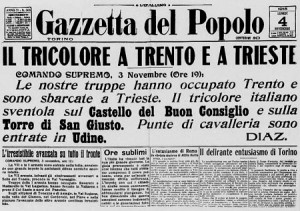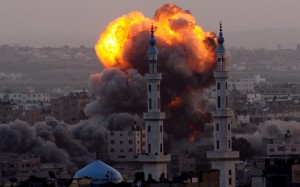
From the ruins of defeat of Caporetto Italian rescue is born: We win in Vittorio Veneto, We release Trento e Trieste, the Austria-Hungary signing the Armistice, the 4 November, the war is over and a few days later we force the Germany to sign the Armistice. The young Italian State, poorly organized and even less equipped, wins the first world war. Factors of this success can be found not in the preparation of the war, as usual underestimated by the General command; certainly not in the power of one was born from just fifty years, but torn apart by internal conflicts: had become the Italy, but not even the Italians; certainly not in the country's domestic economic and political resources: the Italy having always been at the mercy of foreign conquerors was sacked that conduct toward progress. It remains then to consider the human factor, so present in the verses of songs that evoke the World War I. Words like sacrifice, humility, Piave, victory, Italy were on the lips of all the soldiers who were preparing to go to the front, even those ragazzi del ' 99 (1899 means), After the defeat of Caporetto, just fifteen to sixteen years were enrolled in the ranks of the army. Were those ideas and those feelings were born in the nineteenth century by those revolutionary movements, that brought Italy to turn himself in Was, to push those same Italians to defend that same young home. The 4 November 1921, picked up the body of a soldier who died during the first world war and did not know the General information, It was erected in Rome the monument to the unknown soldier and was laid inside the coffin of this soldier. The intent was to keep alive the memory of those who gave their lives to defend the homeland, But today we remember more.
Roberto
The war against Austria-Hungary which, under the guidance of s. M. The king, Duce supremo, the Italian Army, bottom number and means, started on 24 May 1915 and with unshakable faith and dogged unbroken led value and without rest for 41 months is won. The gigantic battle on 24 last October, and to which took part in cinquantuna Italian divisions, three British, two French, a Czechoslovakian and an American Regiment, against seventy-three Austro-Hungarian divisions, is over. The lightning-fast and advanced audacious XXIX Corps out of Trento, barring the way of retreat to the enemy armies of Trentino, overwhelmed by the troops of the 7TH army in the West and to the East by those of the, Vi and IV, determined yesterday total opposing the putrefaction brow. By the irresistible ELAN of the Brenta Tower XII, the 8th, the tenth army and cavalry divisions, increasingly pushes back the fleeing enemy. In the plain, S.A. R. the Duca D'Aosta are advancing so fast at the head of his unswerving armed III, longingly of returning on the positions which it already successfully conquered, that never had lost. The Austro-Hungarian army is annihilated: it suffered severe losses in the fierce resistance of the early days and has lost an awful lot of material quantity in the pursuit of all sorts and almost in full its warehouses and deposits. He left so far in our hands about three hundred thousand prisoners with entire staffs and not less than five thousand cannons. The remains of what was one of the most powerful armies in the world back in disorder and hopeless valleys, they had descended with prideful safety.
Armando Diaz – Supreme Command, 4 November 1918, hours 12




